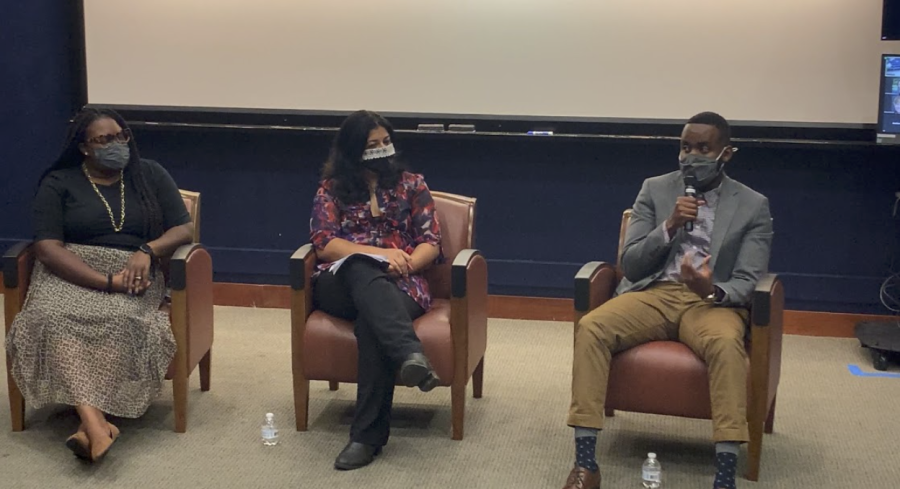“Crisis at the Border” panel discusses Haitian asylum seekers and immigration policy
October 17, 2021
The “Crisis at the Border” panel hosted by the Department of Cultural and Global Engagement on Tuesday, Oct. 12 discussed how the United States can improve immigration regulations and how students can get involved.
The panel was moderated by Director of Multicultural Education and Training Daymyen Layne and three featured panelists– Djess Jacques, Bianca Jordan and Sujata Gadkar-Wilcox.
Gadkar-Wilcox, an associate professor of legal studies, spoke about the importance of having such open conversations about global topics.
“So for me, I think, we probably don’t have enough of these conversations except in an academic context. I think it’s important that the public has a discussion, right? About borders, about immigration, about refugees, and also starts to understand the distinction between categories of people” Gadkar-Wilcox said. In addition to teaching at Quinnipiac University, Gadkar-Wilcox is the executive director of the Oxford Consortium of Human Rights.
Based on the treatment of these Haitian immigrants, Gadkar-Wilcox thought the U.S. was categorizing the migrants for themselves.
“The comparison is we’re welcoming like 50,000 refugees from Afghanistan…they’re deserving, right? We created narratives around who’s deserving, who’s undeserving. And so like, those are deserving refugees, but like the Haitian refugees are not deserving,” Gadkar-Wilcox said.
Haitian asylum seekers are being denied because of Title 42. It was legalized in March 2020, when the Centers for Disease Control and Prevention appealed to former President Donald Trump and his administration saying that an order was necessary to limit migrants crossing U.S. borders due to the public health crisis. Individuals seeking asylum or a place to stay in the U.S. to avoid persecution from their home country, including the Haitian asylum seekers, were expelled or denied without process and sent home.
Since the policy was passed, over 1.2 million expulsions have been carried out and are disproportionately affecting those from Central America, Africa and Haiti.
“[It] violates basic principles of human dignity is, you know, you just have people have a visceral reaction to that,” Gadkar-Wilcox said. “That’s because human dignity means something, not just an international law, but it means something like to most people in a community.”
Jordan, who is an immigration lawyer at Brazen Legal, looked to the audience to help with the issue.
“Everything needs to be consistent and we have the power to push our elected officials to do that,” Jordan said.
President Joe Biden initially had campaigned for more humane treatment of immigrants, but his administration is still in the process of implementing Title 42. Jacques, one of the panelists and also a third-year law student at Quinnipiac, called for audience members to use their powers to enact change.
“I think really what we have to do is be responsible, civil citizens and vote and be engaged and not to just vote and leave, but actually hold our elected officials accountable,” Jacques said. “I think we have more power than we think we do and we should exercise those powers to implement change.”
According to Layne, even though the panel covered a serious topic, the panelists still had hope for the situation.
“There was a certain amount of positivity within our panelists and from some of the community members,” Layne said. “You know, there was a certain amount of hope that folks spoke about with incremental changes to immigration law and immigration policy that folks can see.”
Layne says it is important for students to continue to have these conversations.
“We need to do more of grappling with the things that are going on in the world, so we can expand our own views and sometimes get out of our own bubble,” Layne said. “You know, sometimes when we operate in a certain lane for a certain time we only think about that lane, and before our students get out into the world they need to start thinking about these things now.”







